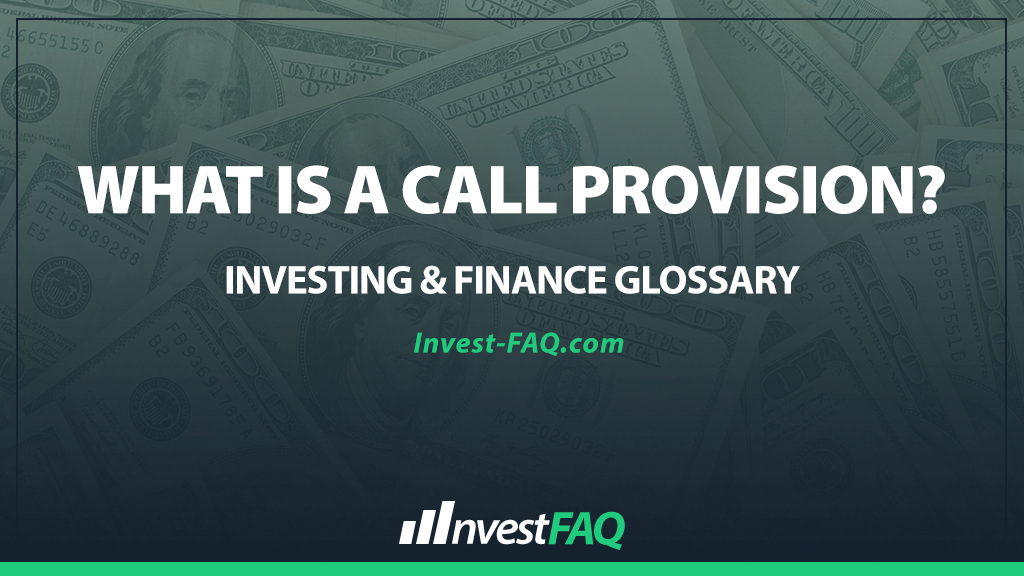
Call Provision
Contents
A call provision is a clause in the contract of a bond or other fixed-income security that grants the issuer the right, but not the obligation, to repurchase and retire the debt instrument at a specified price before its maturity date. This feature is designed to give issuers flexibility to manage their debt effectively, especially in changing interest rate environments.
Businesses and governments include call provisions in their bond issuances as a strategic tool for financial management.
This provision allows issuers to refinance debt when interest rates decline, thereby reducing their future interest payments, or to adjust their capital structure according to evolving financial strategies.
For investors, while call provisions offer potentially higher yields to compensate for early redemption risk, they also introduce the possibility of having the bond called away during favorable interest rate conditions.
Example of a Call Provision
Imagine “Utility Works Inc.,” which has issued $1,000,000 in bonds with a 10-year maturity and a 5% annual interest rate. The bond includes a call provision allowing the issuer to repurchase the bonds at par value after 5 years. Suppose that after 5 years, interest rates in the market have decreased to 3%, prompting Utility Works Inc. to exercise the call provision.
Initial Bond Issuance: The issuance of the bond increases long-term liabilities on the balance sheet by $1,000,000, with cash also increasing by the same amount.
Annual Interest Expense: Each year, an interest expense of $50,000 is recorded, paid to bondholders.
Exercise of Call Provision: Upon deciding to exercise the call provision, Utility Works Inc. records the redemption of the bond by decreasing its cash by $1,000,000 and reducing the long-term liabilities by the same amount.
By exercising the call provision, Utility Works Inc. can take advantage of lower market interest rates to issue new debt at 3% instead of 5%, reducing its overall interest expenses. This strategic financial move requires careful consideration of the call premium and transaction costs associated with issuing new debt.
From an accounting perspective, the redemption of the old bonds and issuance of new bonds involve updates to the balance sheet and recognition of any gains or losses related to the call in the income statement.
Significance for Investing & Finance
The call provision is significant in accounting and financial management for several reasons:
Debt Management Flexibility: It provides issuers with a valuable tool to manage their debt obligations in response to changes in interest rates, potentially leading to significant savings on interest expenses.
Investor Consideration: For investors, understanding the terms of call provisions is crucial for assessing the risk and return profile of a bond investment, as the potential for early redemption affects yield calculations and investment strategy.
Financial Reporting: Proper accounting for the exercise of call provisions and the related transactions is essential for accurate financial reporting, ensuring transparency and compliance with accounting standards.
Strategic Financial Planning: The inclusion of call provisions in debt instruments reflects strategic planning by issuers, allowing them to maintain optimal capital structures and adapt to financial market changes over time.
In summary, a call provision is a key feature in the terms of many fixed-income securities, offering both issuers and investors important considerations in their financial strategies and decisions. For issuers, it provides a mechanism to manage debt cost-effectively, while for investors, it introduces an element of risk that must be weighed against the potential benefits of the investment.
FAQ
How does a call provision impact the yield of a bond for investors?
A call provision may lead to a higher yield on a bond to compensate investors for the risk of the bond being called away before maturity, potentially disrupting their income projections and requiring reinvestment at potentially lower interest rates.
What factors might an issuer consider before deciding to exercise a call provision?
An issuer will consider prevailing market interest rates, the potential cost savings on future interest payments, and the strategic benefits of adjusting the company’s debt portfolio before deciding to exercise a call provision.
Can an issuer exercise a call provision at any time after the bond is issued?
The ability to exercise a call provision is typically subject to specific terms outlined in the bond’s indenture, such as waiting for a predetermined call protection period to expire, which prevents the issuer from calling the bond before a certain date.
Does the inclusion of a call provision affect the initial pricing of a bond?
Yes, the inclusion of a call provision often affects the initial pricing of a bond, generally leading to a slightly higher interest rate compared to similar bonds without call provisions, as investors require additional compensation for the call risk.
